〇 Why Is a Guarantor Required When Renting a Property?
〇 What Are the Requirements to Become a Guarantor?
〇 Are There Strict Screenings for Guarantors Too?
〇 Historical Context Behind the Use of Guarantee Companies
〇 How Do Guarantee Companies Work? How Much Do They Cost?
〇 What Are the Pros and Cons of Using a Guarantee Company?
〇 What Are No-Guarantor Properties? Their Pros and Cons?
〇 Can You Live in UR Rental Housing Without a Guarantor?
When renting a property, you’ll often need more than just financial resources; a guarantor is typically required. For those unfamiliar with living in Japan, the concept of a guarantor may seem foreign. However, there are growing numbers of people who either actively seek no-guarantor properties because they find it troublesome to ask someone to be their guarantor or choose to use guarantee companies to rent a property.
In this article, we’ll explore why guarantors are required for rental properties, the pros and cons of no-guarantor properties and using guarantee companies, how guarantee companies work, their associated costs, and smart ways to find a rental property without needing a guarantor.

When signing a rental contract, one of the most commonly asked questions is about the presence of a "guarantor." Simply put, a guarantor is someone who pays the rent on behalf of the tenant if they fail to do so.
Some people may feel frustrated, thinking, "I’m a regular employee with a stable income; do they really think I might not pay my rent?" or "Not being able to rent without a guarantor feels like I’m not trusted as an adult."
However, whether you’re a full-time employee, a part-time worker, or a contractor, a guarantor is typically required when renting a property. This is because everyone, regardless of their employment status, faces the possibility of losing their income due to job loss, illness, or injury. Even high-income individuals can face unexpected circumstances. For such cases, a guarantor is needed to take on the responsibility of covering unpaid rent.
In addition to unpaid rent, the role of a guarantor extends to covering costs such as compensation for damages caused to the property, like fire or water damage. This obligation applies regardless of whether the damage was accidental or intentional.
So, what qualifications are needed to become a guarantor?
First and foremost, financial stability is the minimum requirement. Generally, the rent is expected to be about one-third of the tenant’s monthly income, and the guarantor’s annual income should be at least 36 times the monthly rent. For example, if the rent is 70,000 yen, the guarantor would need an annual income of at least 2.52 million yen. When broken down like this, the income requirement may not seem too high.
Does this mean anyone with sufficient income can be a guarantor? Not exactly. Only relatives within the third degree of kinship are usually eligible to be guarantors.
In other words, even individuals like a "stepfather" or "sister’s husband" can be asked to act as a guarantor, despite not being blood relatives. However, it becomes challenging to meet the requirements for guarantors beyond the third degree of kinship (e.g., cousins).
Additionally, guarantors must reside in Japan. This is because contacting and resolving issues with someone living abroad can be difficult in case of a problem.
While some properties may exceptionally allow non-relatives to act as guarantors, in most cases, only relatives with sufficient financial stability are accepted.
When signing a rental contract, not only tenants but also guarantors undergo screening.
The most critical factors are income, occupation, and employment status. To prove their income, guarantors may need to submit documents such as withholding tax slips or tax returns. Length of employment may also be checked. While longer employment is generally better, excessively short tenures may raise concerns. Additionally, if the guarantor has a history of missed rent or credit card payments, they may fail the screening.
Surprisingly, age is another factor that may be scrutinized. While it may seem unrelated to being a guarantor, those who are too elderly may be deemed unsuitable. The threshold is often 65 years old. Once a guarantor reaches retirement age, passing the screening becomes more challenging.

Recently, more people are using guarantee companies as a substitute for guarantors or actively seeking properties that don’t require guarantors. This trend is closely tied to societal changes.
First, delayed marriage and the aging of parents play a role. By the time children become independent and start living on their own, their parents are often reaching retirement age. For those living on pensions, it becomes difficult to act as guarantors, even if they have assets. Additionally, nuclear families and declining birthrates mean fewer people can rely on siblings or other relatives.
Changing interpersonal relationships also contribute to the rise in guarantee company usage. In the past, even if someone had a strained relationship with their family, they had no choice but to ask for their help as a guarantor. However, using a toxic parent as a guarantor could mean revealing the address of their new home, preventing them from escaping parental control. By using a guarantee company, individuals can find housing without worrying about family-related issues.
So, what exactly is a guarantee company? Officially referred to as "rental guarantee companies" or "rent guarantee companies," their role is to guarantee rent payments to landlords on behalf of tenants.
Guarantee companies cover the following:
Now, how much does this cost?
There are generally two payment methods for guarantee companies. The first is to pay the guarantee fee in a lump sum at the time of contract signing, and the second is to pay the fee monthly. Some companies also charge additional renewal fees.
The most common payment method is paying a lump sum guarantee fee at the time of signing and a renewal fee every 1–2 years. In this case, tenants typically pay 0.5 months' rent as the initial fee and around 10,000 yen as the renewal fee. In addition to this, tenants also need to pay deposit, key money, agent fees, and renewal fees for the rental property itself.
For monthly payment plans, tenants usually pay the guarantee company 1–2% of their monthly rent. For a property with 70,000 yen rent, this equates to around 700–1,400 yen per month.
Although these fees are not exorbitant, they are additional costs that wouldn’t be necessary if a guarantor were available.
> Examples of Payments to Guarantee Companies <
| Payment Plan 1 | One-time fee: 50–100% of monthly rent |
| Payment Plan 2 | Monthly fee: 1–2% of monthly rent |
| Payment Plan 3 | Initial fee: 50% of monthly rent + renewal fee every 1–2 years (10,000–20,000 yen) |
What happens if you fail to pay rent despite having a contract with a guarantee company? In such cases, the guarantee company will pay the rent or other unpaid amounts to the landlord on behalf of the tenant. The company will then charge the tenant for the unpaid amount plus additional fees. Ignoring these charges could result in the tenant losing their right to live in the property and facing eviction.
It’s crucial not to treat this as a temporary solution, such as thinking, "I’m short on cash this month, so I’ll let the guarantee company cover the rent." This approach will only increase the amount you owe and damage your credit history, potentially affecting future employment or marriage prospects.

What are the advantages of using a guarantee company?
If you cannot use a guarantor or a guarantee company, your only option is to look for no guarantor required properties.
As the name suggests, no guarantor properties do not require a guarantor or a contract with a guarantee company. These properties save both time and money. However, not many people actively choose these properties. Why is that? Let’s examine the advantages and disadvantages.

UR rental properties are well-known for allowing tenants to rent without a guarantor. But how are they different from regular properties? These properties are managed by the Urban Renaissance Agency (UR), an independent administrative agency. Since they are overseen by a public institution, the requirements for tenants are also distinct.
First, in addition to not requiring a guarantor, UR rental properties also do not require key money, agency fees, or renewal fees. This makes them highly attractive due to their low initial costs. For this reason, UR rental properties are popular, but there are conditions to live in them. One of these is meeting a specific income requirement. Tenants must earn at least four times the monthly rent of the property they wish to rent.
Moreover, UR rental properties are often more spacious and well-maintained compared to regular properties, with investments made in renovations and refurbishments. As a result, their rent tends to be slightly higher.
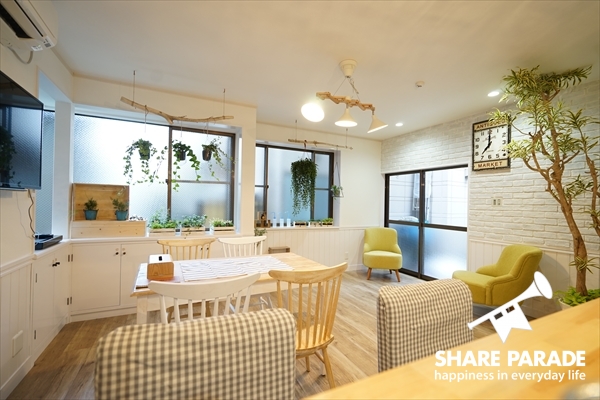
If you don’t have a guarantor or can’t afford to use a guarantee company, a share house is a great option for you.
Most share houses do not require a guarantor or the use of a guarantee company. Instead, you’ll need to deposit a security deposit, also known as a “deposit.” The average deposit amount is approximately 30,000 yen, though it can be as high as 50,000 yen for share houses with higher rent due to their environment or amenities. If this concerns you, make sure to check in advance.
The deposit also serves as a security deposit. If you damage the share house facilities or dirty your room, the cost of the damages will be deducted from your deposit.
However, as long as you use the property normally, deductions are unlikely.
This deposit is refunded when you move out, making it a very cost-effective option. However, some share houses offer only partial refunds or no refunds at all, so it’s essential to confirm this before moving in.
Additionally:
These are just some of the many benefits of living in a share house.
If you’re searching for properties that don’t require a guarantor, why not consider a share house as one of your options?
Even if you can’t find a guarantor, you can still move into a regular property by using a guarantee company, or you can opt for no guarantor required properties without any screening. However, keep in mind that using a guarantee company is more expensive than renting a typical property with a guarantor. For those in a hurry to move in or looking to save on initial costs and living expenses, a share house that only requires a deposit is a highly recommended option.
Finally, here are some affordable share house options that don’t require a guarantor or a guarantee company!



This share house is newly built and located just one stop away from Ikebukuro Station. Despite being so close to Ikebukuro Station and having a clean, modern building, the rent starts from just 49,000 yen, offering great value for money.
The lounge is available on both the basement level and the second floor, giving you the option to choose your preferred space. Additionally, the powder room, which is a delightful feature for women, is a great point of appeal. Of course, all rooms come fully furnished with essential furniture.
| Property Name | : | Couverture Ikebukuro Nishi |
| Move-In Requirements | : | Open to both men and women, foreigners welcome |
| Rent | : | 49,000 to 59,000 yen |
| Maintenance Fee | : | 15,000 yen |
| Number of Rooms | : | 31 rooms |
| Access | : | 7-minute walk from Seibu Ikebukuro Line "Shiinamachi" Station |
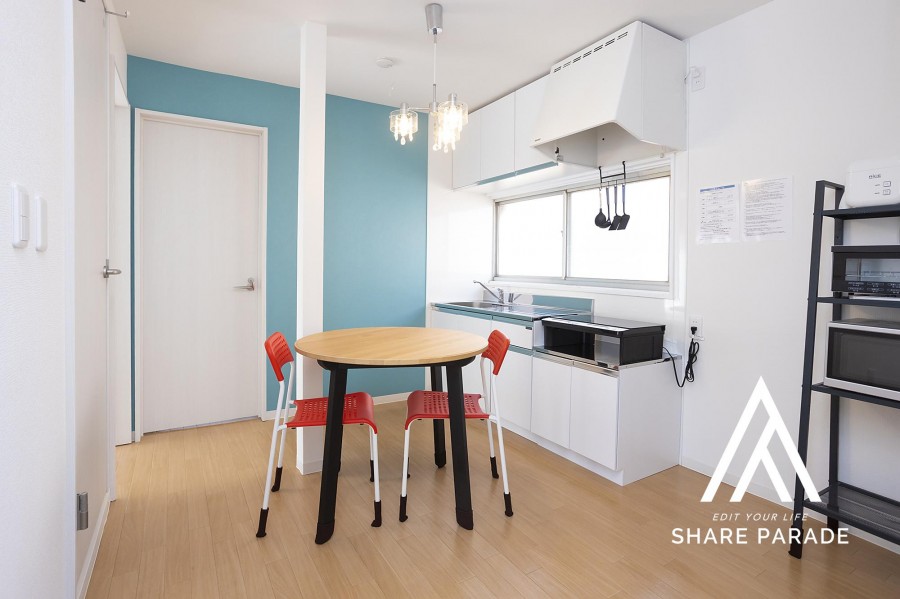
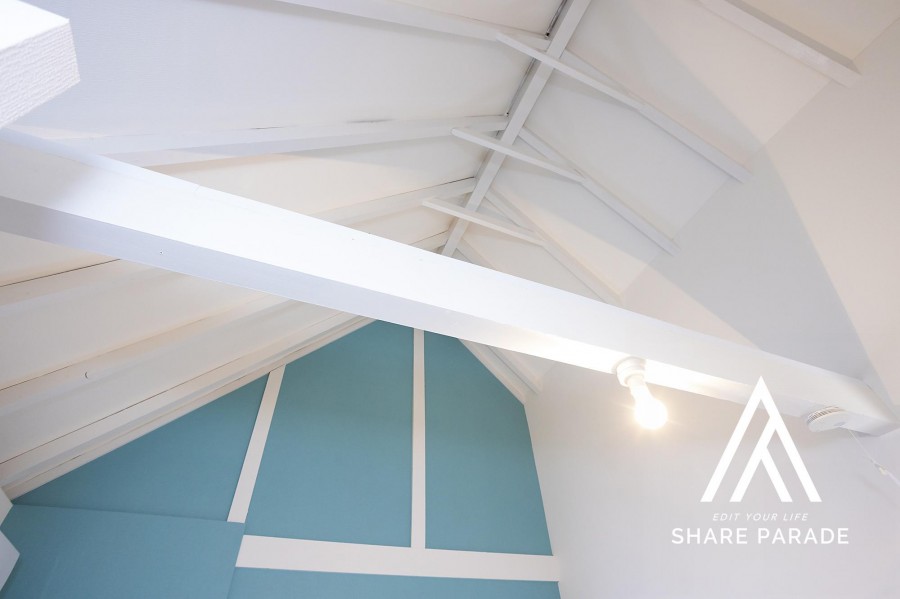
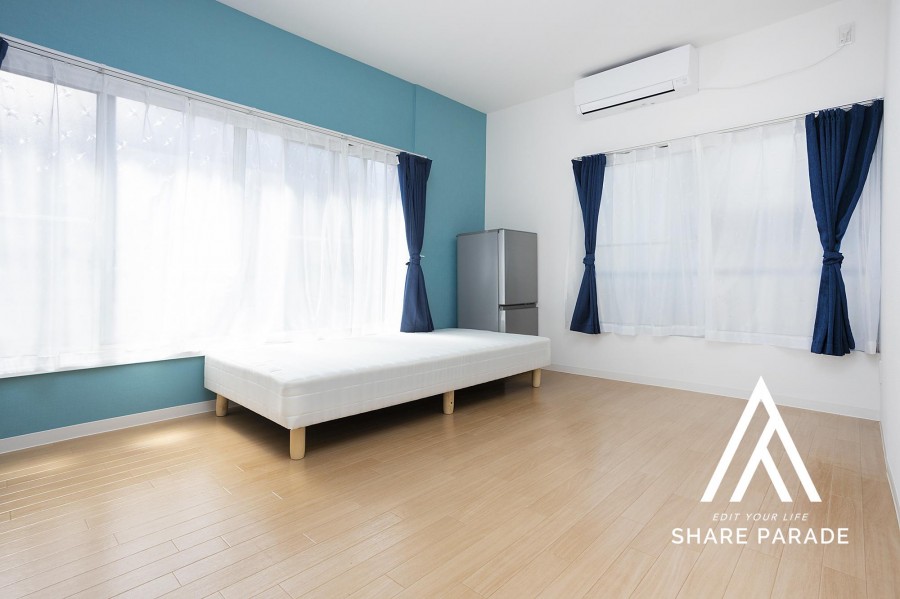
This is a women-only share house located just 8 minutes from Kitasenju Station. The most surprising aspect is the incredibly low rent starting at just 28,800 yen when applying the campaign offer. A private room for under 30,000 yen is exceptionally rare.
While the living room is not particularly spacious, the private rooms range from 5 to 6 tatami mats (approx. 8–10 square meters), offering sufficient space. Additionally, there are supermarkets and convenience stores near the station, providing a comfortable living environment.
| Property Name | : | Community House Kitasenju Kanamachi |
| Move-In Requirements | : | Women only, foreigners welcome |
| Rent | : | 28,800 to 32,800 yen |
| Maintenance Fee | : | Actual expenses |
| Number of Rooms | : | 8 rooms |
| Access | : | 13-minute walk from Joban Line "Kanamachi" Station |
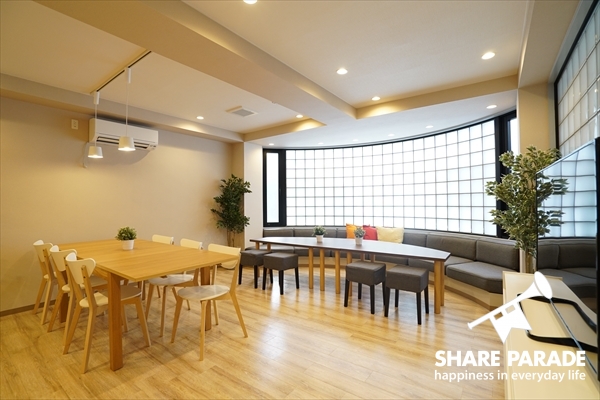
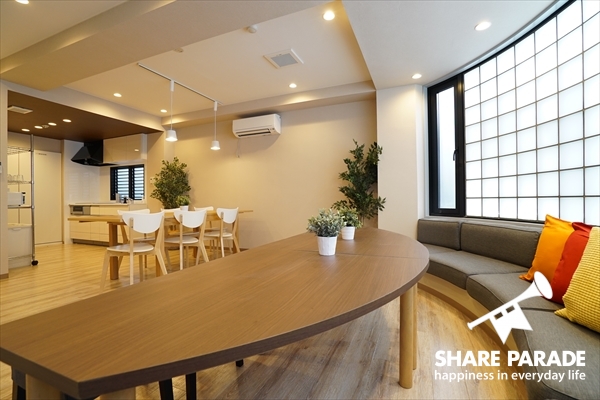
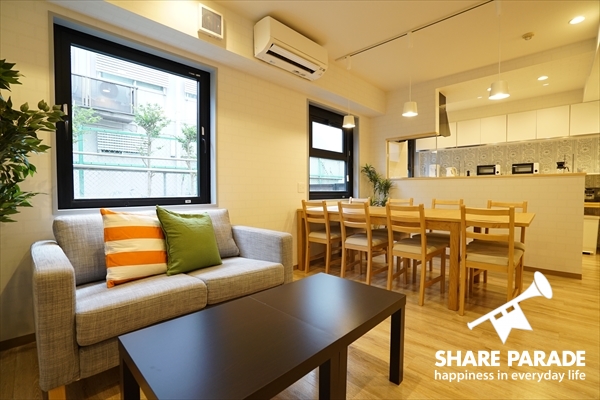

This large share house is located just a 5-minute walk from Nishikasai Station. It features three communal lounges, which is quite rare. Being able to choose your spot based on your mood or how crowded it is can be a great advantage. Nishikasai Station offers excellent access to business districts, including Kayabacho Station in 12 minutes, Nihombashi Station in 13 minutes, Otemachi Station in 15 minutes, and Kudanshita Station in 19 minutes.
The residents are not just Japanese but also include people from France, the UK, Denmark, the US, and Taiwan, making it an excellent choice for those who want to enjoy international exchanges.
| Property Name | : | Couverture Nishikasai |
| Move-In Requirements | : | Men and women OK, foreigners welcome |
| Rent | : | 49,000 to 57,000 yen |
| Maintenance Fee | : | 15,000 yen |
| Number of Rooms | : | 38 rooms |
| Access | : | 5-minute walk from Nishikasai Station (Tozai Line) |
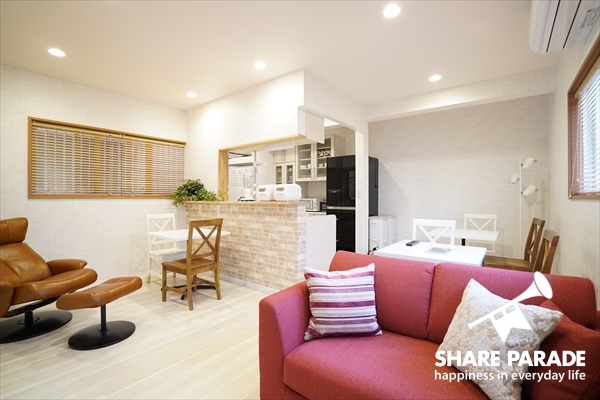
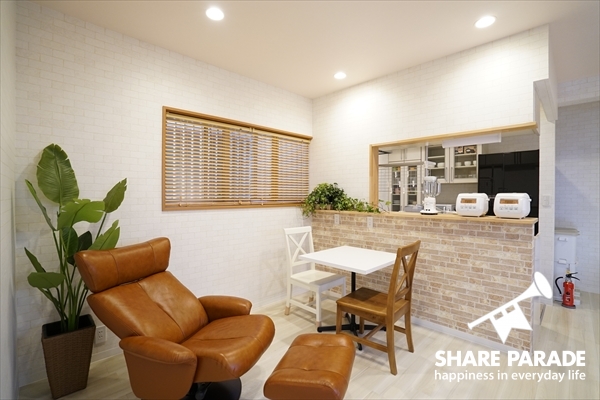
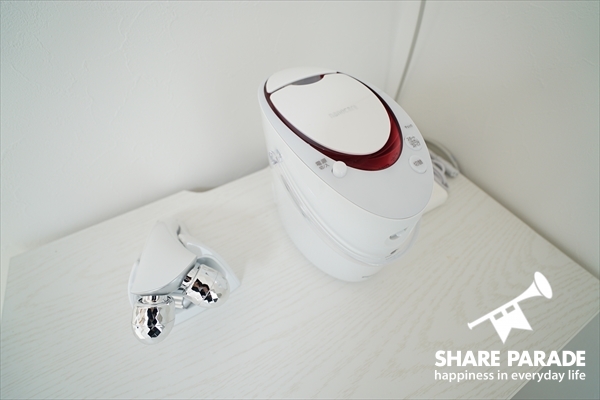
A beauty share house produced by an esthetic salon. Each room is equipped with beauty appliances such as steamers, making daily self-care treatments possible. The kitchen includes a water purifier, and the bathroom features a filtration system, demonstrating a focus on water quality.
Each room emphasizes private space with soundproof sheets installed on the walls, ceiling, and floor, significantly enhancing noise insulation from everyday sounds and creating a stress-free living environment. This thoughtful design is a key highlight.
| Property Name | : | Beauty House Nishiarai III |
| Move-In Requirements | : | Women only |
| Rent | : | 40,000 to 47,000 yen |
| Maintenance Fee | : | 15,000 yen |
| Number of Rooms | : | 6 rooms |
| Access | : | 10-minute walk from Daishimae Station (Daishi Line) |

東京一人暮らしアドバイザー。 学生時代は下北沢や吉祥寺で過ごし、現在は高円寺在住。 趣味は一人暮らしでもカンタンに作れる、料理・お菓子・パン作り、カフェ巡り、便利でカワイイ雑貨集め。 経験に基づいた一人暮らしの物件探し、防犯情報、お得な節約法・料理術などを提案していきます。最近、シェアハウスへの取材も多く実施しています。 Tokyo Solo Living Advisor. Lately, I have been conducting many interviews about share houses and Japanese language schools.